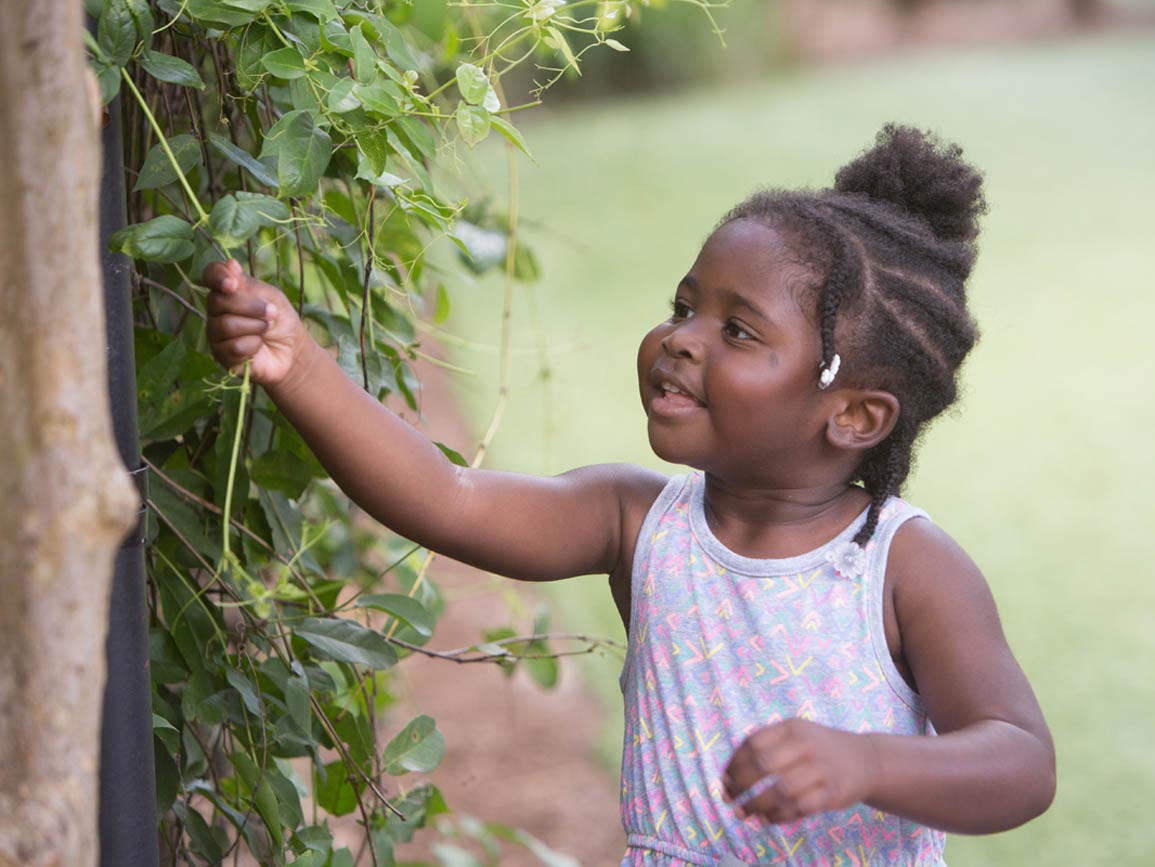Most of us spent ample time in nature as children, climbing trees, exploring rocks and bugs, or even just playing games outdoors with friends. Little did we know that these fun activities were actually building our brains, bodies, and characters for later life. Today, ample research has shown that nature exposure has numerous long-term benefits.
What Are the Benefits of Playing in a Natural Environment?
Outdoor play fosters children’s intellectual, emotional, social and physical development. And by being outside and surrounded by nature, children experience an ever-changing and free-flowing environment that stimulates all the senses.
Intellectual Benefits
The natural world is a giant, open-ended learning laboratory. Children are innate scientists and love to experience the sights, scents, sounds, and textures of the outdoors. Nature provides countless opportunities for discovery, creativity, problem-solving, and STEM education.
Interacting with natural environments allows children to learn by doing and experiment with ideas. In nature, children think, question, and make hypotheses — thereby developing inquisitive minds. Whether they’re judging the distance between two rocks before jumping or considering where insects go in the winter, children are constantly thinking when they’re in nature. These experiences offer real, authentic learning like nothing else can. As children take risks, try and fail, and try again, they gain resilience and confidence.
Here are some brain building nature activities for children:
- Build with and dig in dirt
- Watch worms wriggle through the soil
- Gaze at clouds
- Jump in puddles
- Listen to birds sing
- Smell fresh-cut grass
- Collect seeds
- Construct things with twigs and mud
Emotional Benefits
Being outside feels good. Children are free to explore, move about, and make noise — all delightful forms of self-expression that are often restricted indoors. In nature, children can run, jump, hop, skip, climb, roll, and shout, which relaxes, and reduces tension, anxiety, and restlessness.
Furthermore, nature enhances a sense of peace and often brings out nurturing qualities in children. Many energetic children slow down to dig a hole in sand, watch a ladybug crawl, or spend focused time playing with a stick in a mud puddle. Several studies have found that exposure to nature can reduce symptoms of ADHD and anxiety.
Social Benefits
When children play outdoors there may be opportunities to interact with new and different playmates. In nature, children can play alone or connect with one another, learn to share, and problem solve. In the natural world, children often collaborate to make up games and rules because there are no prescribed sets of instructions. When exploring outside, school-age children may not be in close proximity to adults, which gives them time to make up their own rules and solve their own problems without inhibition.
Often, when involved in the natural world, even boisterous, active children may slow down and learn to focus on being gentle. They also may develop empathy and reach out to console a friend who seems hurt or sad.
Physical Benefits
The fresh air of the natural world is invigorating and offers endless opportunities for physical activity, which, in turn, builds strong bodies. Exposure to sunlight means children absorb vitamin D which has many positive benefits, including contributing to a strong immune system.
Outdoor play also allows a child to be more physically active than indoor play, potentially burning more calories and contributing positively to a child’s overall fitness.
Some of these outdoor activities include:
- Climbing trees
- Chasing a friend
- Standing on one foot
- Falling over
- Hanging and swinging from bars
- Jumping over or into puddles
And what’s good for kids is also good for parents. Don’t be afraid to join in. Nothing beats trying to cross a stream by stepping from rock to rock (even if a sneaker gets wet or a knee gets bruised), or climbing a tree higher than you knew your child could climb. Providing a reasonable balance of risk and safety is the job of parents, and providing some level of challenge allows children to learn new skills.
Environmental Benefits
In addition to the individual benefits gained by being connected to nature, there is a collective benefit shared by all of us. Children all over the world play outside, creating a unity of shared experiences. Our children are future stewards of the earth. In order to raise adults who are passionate about protecting the environment and preserving our planet, they must first develop a deep love for it. The only way to enable children to grow comfortable in nature is to open the door and let them out to explore the wonder and awe of the natural world.Teach. Play. Love. Podcast: Summer Learning Starts Outside
Rachel Robertson, Bright Horizons education and development vice president discusses how to boost traditional math, science, and language skills with outdoor activities.
More on Children & Nature
- Having your children help out outside may be beneficial for both parties. Learn how outdoor chores can help kids self-regulate their behavior.
- Gardening doesn't have to be expensive, complicated, or time-consuming. Learn how you can get started on a simple garden project with your child today.
- Enjoy these fun, indoor and outdoor ideas that will promote family bonding and help support your child’s learning and development.





